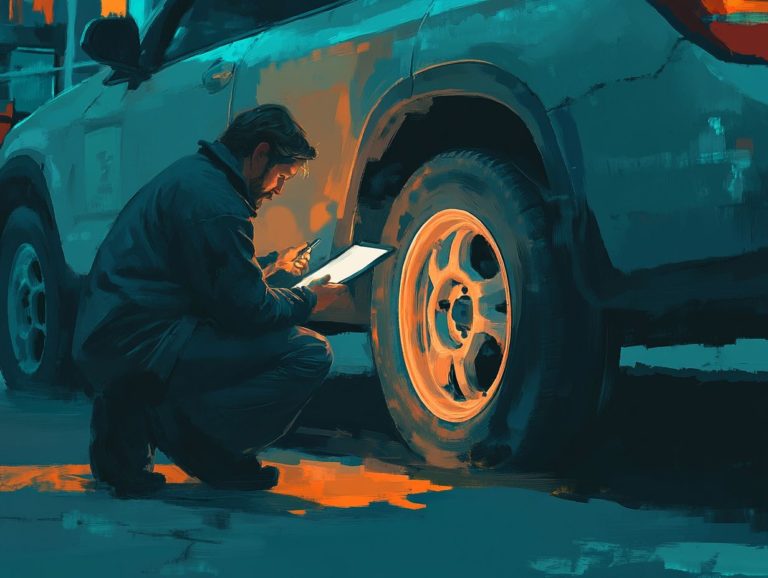5 Essential Steps to Buying a Used Car
Buying a used car can spark both excitement and fear. With many options available to you, it s important to be careful when choosing a vehicle that fits your needs and budget.
This article outlines five essential steps to navigate your journey, from setting a budget to ensuring the reliability of your chosen car through a thorough mechanic s inspection.
It discusses the pros and cons of buying used vehicles, highlights what to look for, and offers negotiation strategies that empower you to make a smart purchase.
Whether you re embarking on this adventure for the first time or you re an experienced buyer, these insights will help you drive away with confidence and peace of mind.
Contents
- Key Takeaways:
- 1. Determine Your Budget
- 2. Research the Make and Model
- 3. Check the Vehicle History Report
- 4. Test Drive the Car
- 5. Have the Car Inspected by a Mechanic
- What Are the Advantages of Buying a Used Car?
- Frequently Asked Questions
- What are the 5 essential steps to buying a used car?
- How do I determine my budget for buying a used car?
- What should I research and consider when selecting a make and model for a used car?
- How important is inspecting a used car before purchasing?
- Why is test driving a used car important?
- How can I negotiate a fair price for a used car?
Key Takeaways:
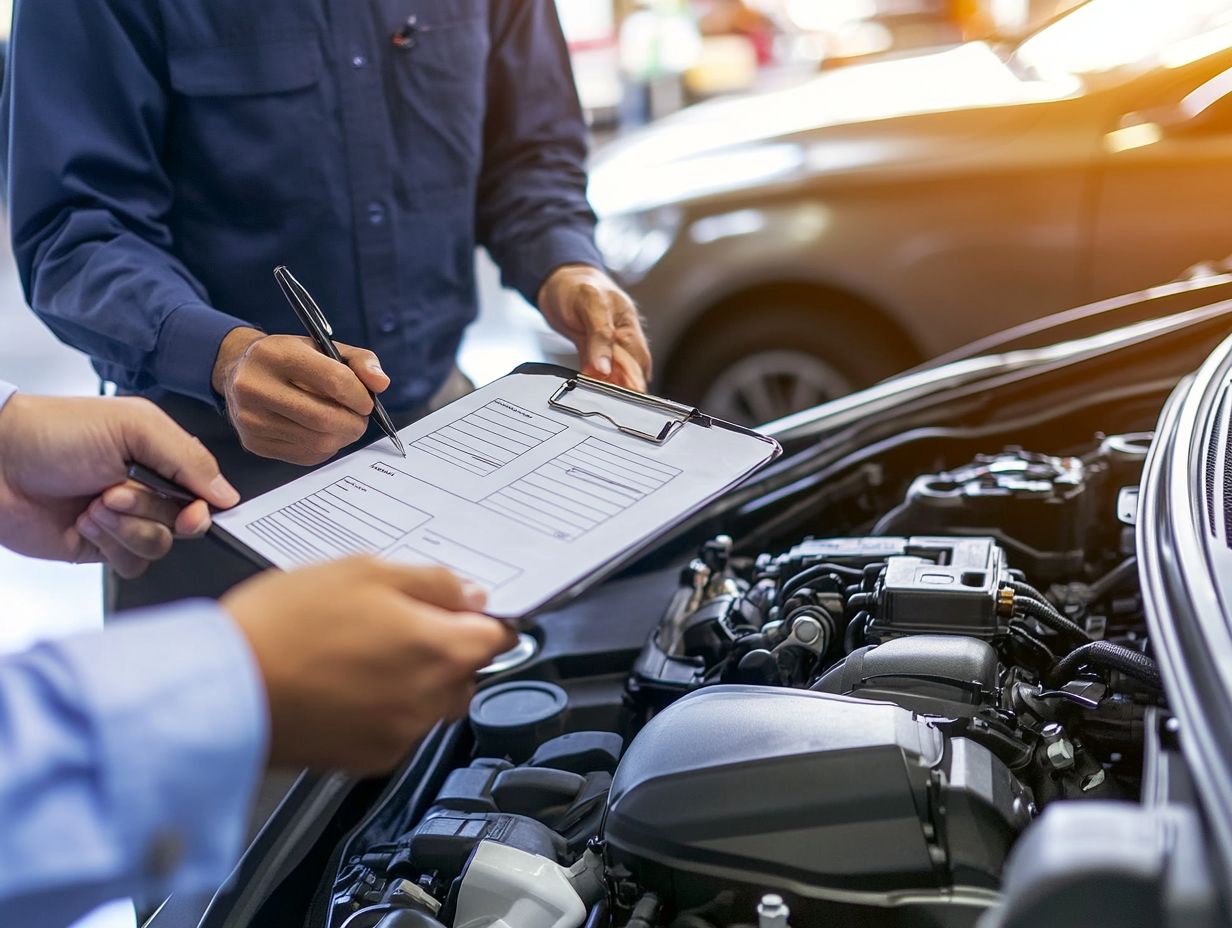
- Determine your budget before starting the used car buying process to avoid overspending and financial stress.
- Research the make and model of the car you are interested in to ensure it meets your needs and has a good reputation for reliability.
- Always check the vehicle history report to uncover any potential issues or accidents in the car’s past. It’s important to have a clear understanding of the car’s history before making a purchase.
1. Determine Your Budget
When you begin the journey of buying a used car, one of the first and most important steps is determining your budget. This budget should include not just the purchase price but also additional costs like insurance, sales tax, and potential extended warranties, which cover repairs after the standard warranty ends. For more guidance, check out these 5 tips for buying a used car from a private seller.
To create a comprehensive budget, thoroughly evaluate the total costs. This includes car insurance premiums, local sales tax, and any registration fees that might surprise you. It’s also vital to consider depreciation, as this affects the car’s value over time and impacts your resale potential.
Your financial planning should also involve exploring financing options like auto loans to secure better interest rates and manageable monthly payments. Taking this holistic approach ensures your purchase aligns with your long-term financial health and meets your expectations.
2. Research the Make and Model
Researching the make and model of the used car you’re considering is crucial for understanding its value and reliability, as well as keeping in mind 5 things to consider before buying used that may arise during ownership.
Diving into past performance data can provide insights into historical values, helping you determine whether you re getting a fair deal. Reliability ratings from reputable consumer organizations help set your expectations regarding maintenance costs and longevity, while user reviews offer real-life experiences that could highlight specific quirks or advantages.
Examining the vehicle history report is non-negotiable. This report reveals any accidents or mechanical issues, giving you the power to make well-informed decisions. Check the Vehicle Identification Number (VIN) for important details like recalls and service records, further protecting your investment.
3. Check the Vehicle History Report
Conducting a thorough examination of the vehicle history report is essential when you re in the market for a used car. This report provides critical insights into the vehicle’s past ownership, any accidents it may have endured, and potential mechanical issues that could impact its performance.
Using the Vehicle Identification Number (VIN), you can easily access this vital report through various specialized online services. Once you have the report, scrutinize details such as previous accident records, title status, and odometer readings. Each of these factors can significantly influence your buying decision.
Identifying past accidents is particularly significant; they can compromise the car’s performance and safety, as well as hint at a potential decline in value over time. By considering this information, you’ll be equipped to make informed choices, ensuring that the vehicle you choose aligns with both your safety priorities and financial considerations.
4. Test Drive the Car
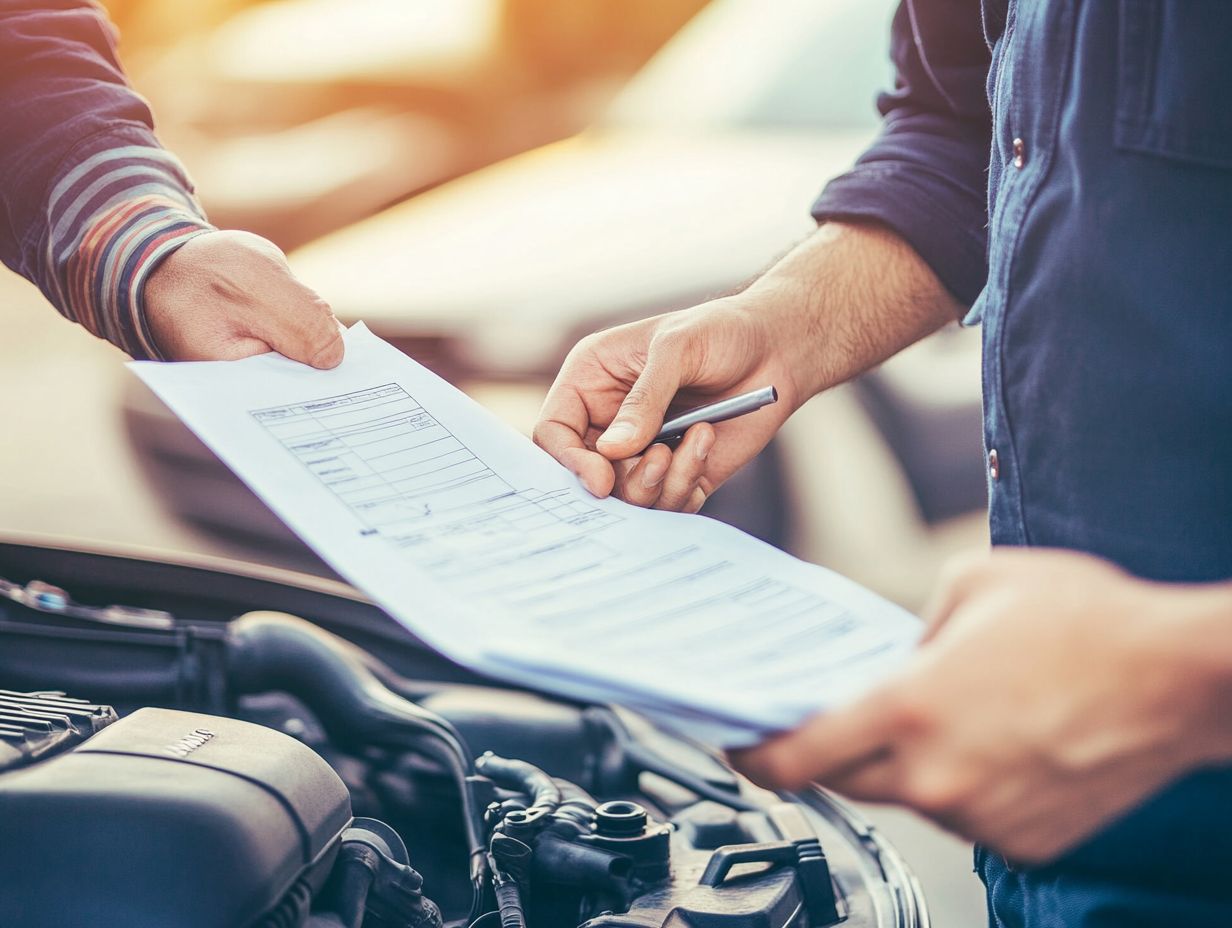
Test driving a car is crucial when buying used. It helps you check the vehicle’s performance and comfort.
Before you drive, review the maintenance records. This will give you insight into the car’s reliability.
While driving, observe how the car handles sharp turns. Assess how responsive the engine is when you accelerate.
Also, check how comfortable the seats are and whether the controls are easy to adjust. These details can greatly impact your driving experience.
Buying from a dealer may offer added benefits, like warranties. However, private sellers may provide more room for negotiation.
5. Have the Car Inspected by a Mechanic
Get a trusted mechanic to check the car. This step can uncover hidden car problems that you might miss.
When choosing a mechanic, research local reviews and ask for recommendations. Make sure they are certified.
A professional inspection should look at brakes, suspension, the engine, and electrical systems. Use a checklist to make sure you cover all important details.
Remember, inspections can vary. Dealers often follow strict standards and provide warranties, while private sellers may not disclose all issues.
What Are the Advantages of Buying a Used Car?
Buying a used car has many benefits. These include lower prices and less depreciation, which saves you money.
Used cars lose value more slowly than new ones. This means a lower overall cost of ownership.
You might find that car insurance is cheaper, too, since used cars have lower values. Consider adding an extended warranty for added peace of mind.
Choosing a used vehicle is a smart financial choice that puts you in a better position.
What Are the Disadvantages of Buying a Used Car?
Despite the benefits, there are some disadvantages to consider. Mechanical problems and unknown vehicle histories are risks.
Many used cars come with limited warranties. This can leave you responsible for unexpected repair costs.
To reduce these risks, always obtain a vehicle history report. This report reveals past accidents and maintenance.
A thorough state inspection checks that the vehicle meets safety and emissions standards. This provides reassurance before you commit financially.
What Should You Look for in a Used Car?
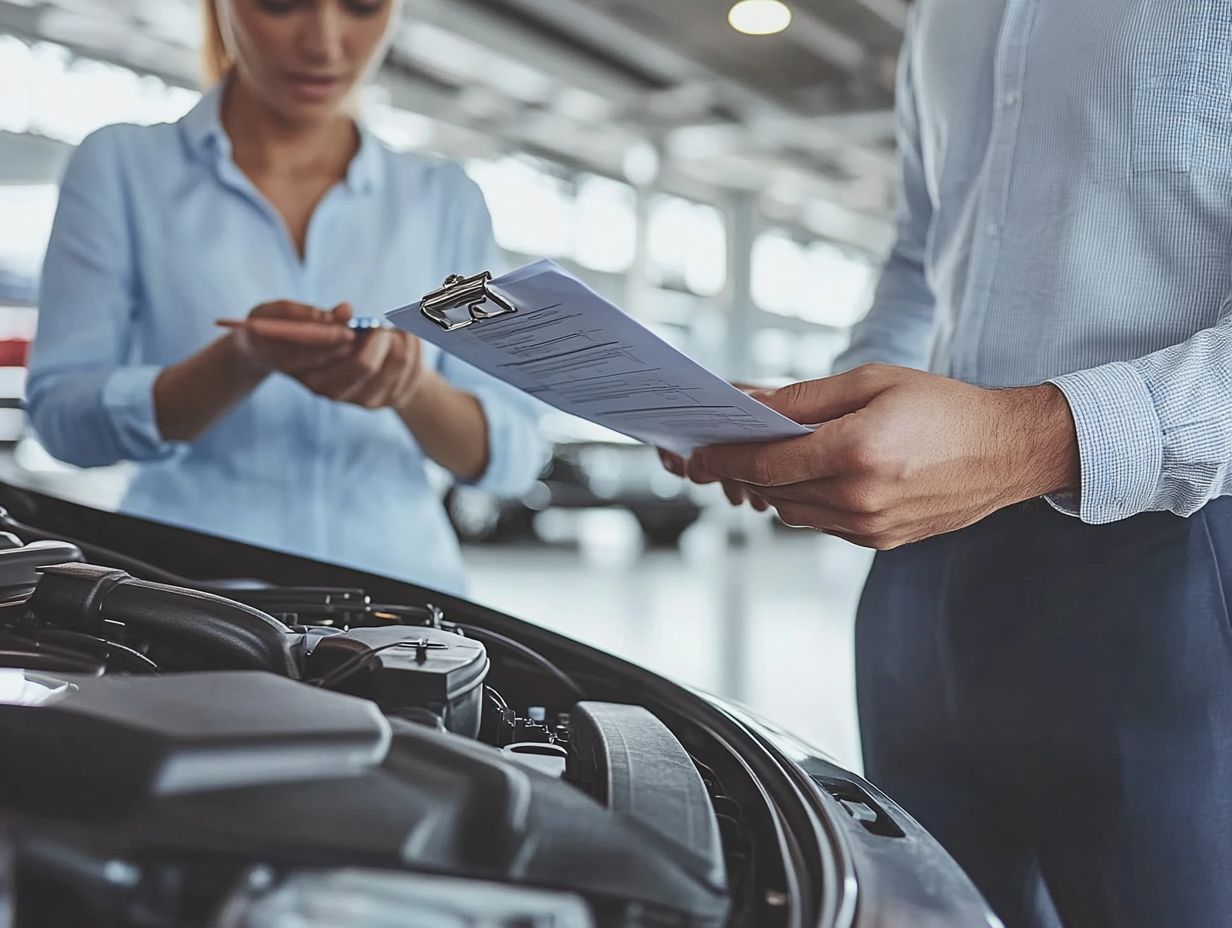
When you evaluate a used car, having a detailed list of things to check at your fingertips is essential. This guide will also provide 5 essential tips for buying new cars online to help you inspect key factors like maintenance records, overall condition, and the vehicle’s current market value.
Be sure to conduct a thorough examination for rust; it can reveal hidden issues that might lead to expensive repairs down the road. Assessing the tire condition is equally crucial for ensuring safe handling and estimating upcoming maintenance costs.
Don t overlook the quality of the interior; it often reflects how well the previous owner cared for the vehicle. Reviewing the car’s maintenance records will provide invaluable insights into its history, confirming that it adhered to servicing schedules.
Finally, stay informed about market trends to accurately assess the car s value, ensuring you secure a fair deal based on comparable sales.
How Can You Negotiate the Price of a Used Car?
Negotiating the price of a used car might feel daunting, but with the right strategies and a solid grasp of the car’s value and maintenance history, you can debunk common misconceptions by referring to the 5 myths about buying used cars and secure a fair deal.
When you have a comprehensive vehicle history report in hand, you can confidently challenge inflated prices.
Use important documents of past accidents, ownership changes, and maintenance records as your allies. Understanding market trends for similar models is also crucial; it gives you the power to articulate why your specific offer accurately reflects the car’s true value.
This mastery of information not only bolsters your bargaining position but also paves the way for a smoother negotiation process, allowing you to engage in discussions with confidence and clarity.
Ultimately, a well-researched approach transforms what often appears to be a stressful encounter into a manageable and even enjoyable experience.
What Are the Legal Requirements for Buying a Used Car?
Understanding the legal requirements for purchasing a used car is important for ensuring a seamless transaction. This process involves transferring the title, registering your vehicle, obtaining full car insurance, and meeting your sales tax obligations. Additionally, it’s wise to consider the top 5 questions to ask before buying a used car to make an informed decision.
You ll typically begin by gathering key documents, including the bill of sale and the seller s title. Once you finalize the purchase, it s time to visit the DMV. Here, you ll need to fill out the necessary forms to facilitate the title transfer and update your registration information.
Don’t forget the DMV is key in verifying ownership! Make sure you have all your paperwork ready.
Before you hit the road, securing full car insurance is not just a legal requirement it also provides you with peace of mind against any unforeseen circumstances.
What Are the Red Flags to Watch Out for When Buying a Used Car?
When you’re in the market for a used car, it’s essential to keep your eyes peeled for red flags that could signal potential problems. Look out for inconsistent vehicle history, a lack of photo documentation, and any signs of mechanical issues that might lead to costly repairs in the future. Additionally, consider reviewing these 5 tips for buying a used luxury car to ensure a wise investment.
You should also watch for mismatched VINs, which could indicate theft or serious accidents, as well as poor maintenance records that suggest the vehicle hasn t been well cared for. Pay attention to unusual wear and tear worn-out tires or a frayed interior can hint at neglect.
It s vital to obtain a comprehensive vehicle history report, as this crucial document can reveal red flags like previous accidents, flood damage, or title issues, ultimately giving you the power to make a more informed decision.
Frequently Asked Questions
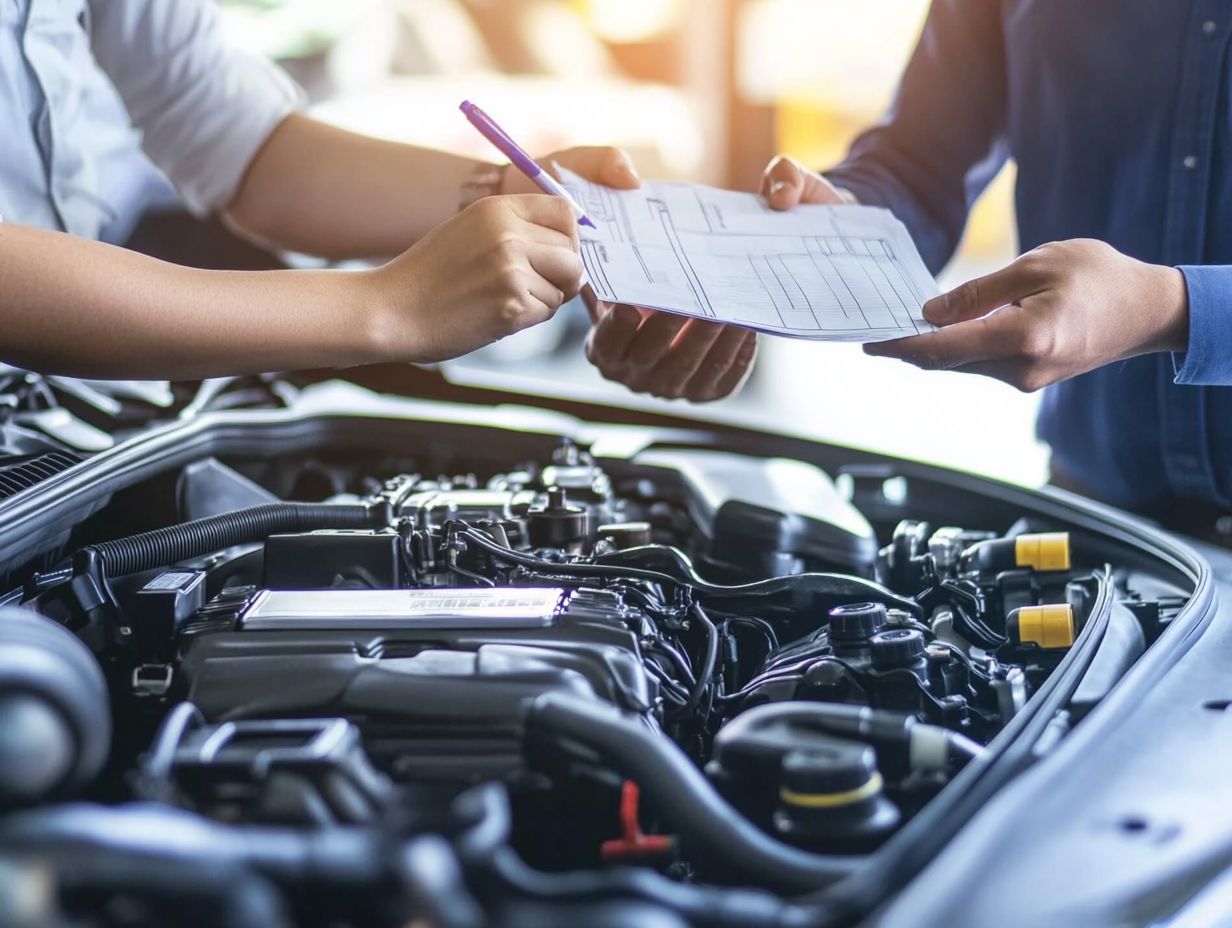
What are the 5 essential steps to buying a used car?
- Determine your budget.
- Research and select a make and model.
- Inspect the vehicle.
- Test drive the car.
- Negotiate the price.
Ready to find your perfect used car? Start your search today!
How do I determine my budget for buying a used car?
To determine your budget, assess your financial situation. Consider your income, expenses, savings, and loans.
Factor in the costs of insurance, maintenance, and repairs.
What should I research and consider when selecting a make and model for a used car?
Research the vehicle’s reliability, safety ratings, fuel efficiency, and cost of ownership. Also, think about your needs, like size, style, and features.
How important is inspecting a used car before purchasing?
Don t skip the inspection! It s your chance to ensure you re making a smart investment. It helps you spot issues and negotiate a fair price.
Be sure to check the interior, exterior, and under the hood.
Why is test driving a used car important?
Test driving a used car lets you feel how it performs. Listen for unusual noises and test the features.
How can I negotiate a fair price for a used car?
Research the market value for the type of car you want. Use this data to make a reasonable offer, and be ready to walk away if needed.
Request a vehicle history report to confirm you re paying for the car’s true condition.





